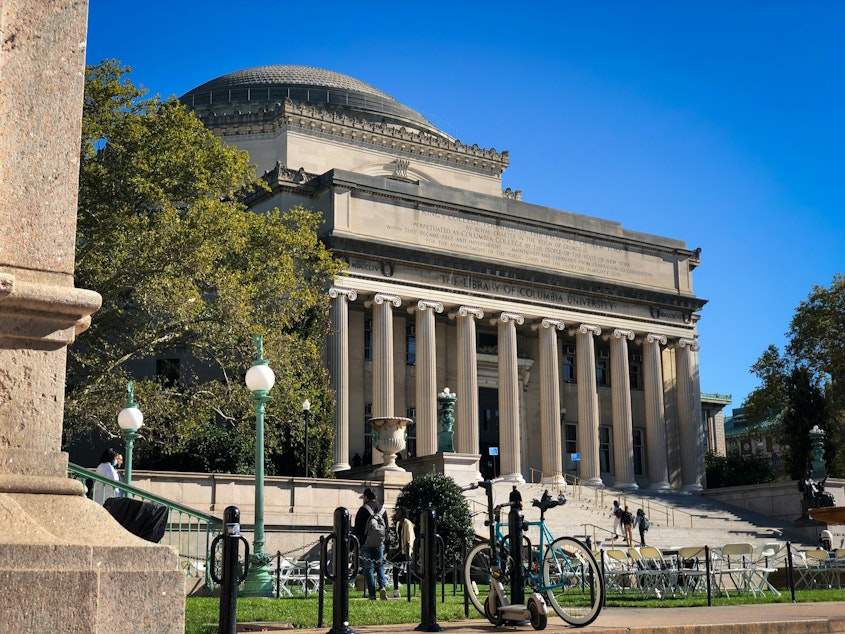'I thought Columbia was going to save me': The realities for first-generation college students

For some students coming from under-resourced high schools, going to college seems like a beacon of light that will solve all their problems.
Students are told that at college they'll gain access to things they didn't have in high school — health care, stable housing, regular meals, a gym, tutoring, extra-curricular activities, and more.
But when KD got into their dream university, they quickly realized going to college wouldn't end their struggle with depression.
RadioActive’s Jana Le has this story about her friend.
This story contains discussion of mental health and suicide.
[RadioActive Youth Media is KUOW’s radio journalism and audio storytelling program for young people. This story was entirely youth-produced, from the writing to the audio editing.]
K
D is a rising junior studying race and ethnicity along with creative writing at Columbia University in New York City.
KD was born in Ho Chi Minh City, Vietnam, but was raised in Everett, Washington. They graduated from Mariner High School as a first-generation, low-income college student, meaning they are the first person in their immediate family to attend a four-year university in the United States.
Sponsored
Mariner High School has a vibrant student community. But because most students at Mariner are part of low-income households, the school doesn't have a lot of funding and resources. And KD said there weren’t enough counselors to support students like them — students with multiple undiagnosed mental illnesses.
"I had a learning disability, and I didn't realize that until much later," KD said. "But looking back, my teachers were never really accommodating."
But despite their lack of resources, KD worked hard to get into their dream school, Columbia University.
"I am going there on a full ride with additional scholarships, so it was just like this really amazing thing," they said. "I felt like I had won the lottery."
But there was a catch to KD’s lottery.
Sponsored
"The coursework was very intense," they said. "I was working two jobs and I was also especially underprepared for it because it was nothing like what I was used to in high school."
KD had to work two jobs because their family was relying on them financially. Despite being states away, they still were helping their family translate paperwork and file taxes.
These factors compounded to exacerbate their mental health struggles.
"All of the things from high school that I thought I was leaving followed me into Columbia, and it was just as bad," KD said.
Sponsored
As a low-income student, KD also felt alienated among their peers.
"It's really strange — eerie almost — to be surrounded by that type of immense wealth, knowing at home my family is experiencing the opposite, they said. "It's very disillusioning and isolating."
KD has access to therapy through Columbia’s health insurance, but currently, Columbia only has 52 mental health providers to serve a population of 33,000 students.
This means KD could only see their therapist every one to two months for up to 40 minutes. Their sessions were often cut short due to lack of stable internet or a private space. If KD wanted more support, they would have to pay out of pocket, which is not financially feasible.
Sponsored
While applying for disability accommodations at Columbia, KD found that the process was really extensive and complex.
"It makes applying for accommodations when you're already disabled really, really challenging," they said.
This year, over 1,500 Columbia students signed a petition demanding increased mental health care services. This was in response to a student’s suicide. But KD isn't optimistic much will change.
"People in power almost never listen to our demands, unless we, like, paint it out for them," they said.
As I head into my first year of college, I wonder: While marginalized students continue to advocate for their community’s needs, when and how are universities going to be accountable and do the work to uplift their students, especially first-generation, low-income students?
Sponsored
Oftentimes when these students are accepted into college — especially prestigious ones — they’re portrayed as the exceptions of their communities.
"This sounds cheesy, but essentially, I thought Columbia was going to save me," KD said. "I thought it was going to be my ticket out of poverty. I'm likely going to be able to make a lot of money, at least a lot more than my parents make, so that was just... a lot on my shoulders."
But the stories of first-generation, low-income students are more complex than these flat 'success stories.'
"I feel like we're used to feeling like maybe this is just our fate, like this is how it's always gonna be. And honestly, sometimes I still feel that way," KD said. "And if that’s what I believe, that might always be the truth. And it shouldn’t be. So we need to believe in more. If it sounds unrealistic and silly, then we need to be radically delusional, radically optimistic, because we all deserve to feel like we are supported and loved. And we deserve to be happy."
For KD, this means institutional change — adequate mental health care and support networks for first-generation, low-income students.
Because they still struggle with mental health today.
This story was produced in a RadioActive Youth Media introductory workshop for high school-age youth. Production assistance by Nina Tran. Consultation support from Ruby De Luna. Prepared for the web by Kelsey Kupferer and Kyle Norris.
Find RadioActive on Instagram, TikTok, YouTube and Facebook, and on the "RadioActive" podcast.
Support for KUOW's RadioActive comes from the Bill & Melinda Gates Foundation Discovery Center and BECU.
Editor's note, 5/12/25: This story has been revised to remove some identifying information about KD due to safety concerns.

